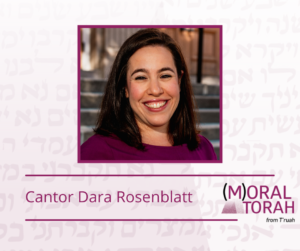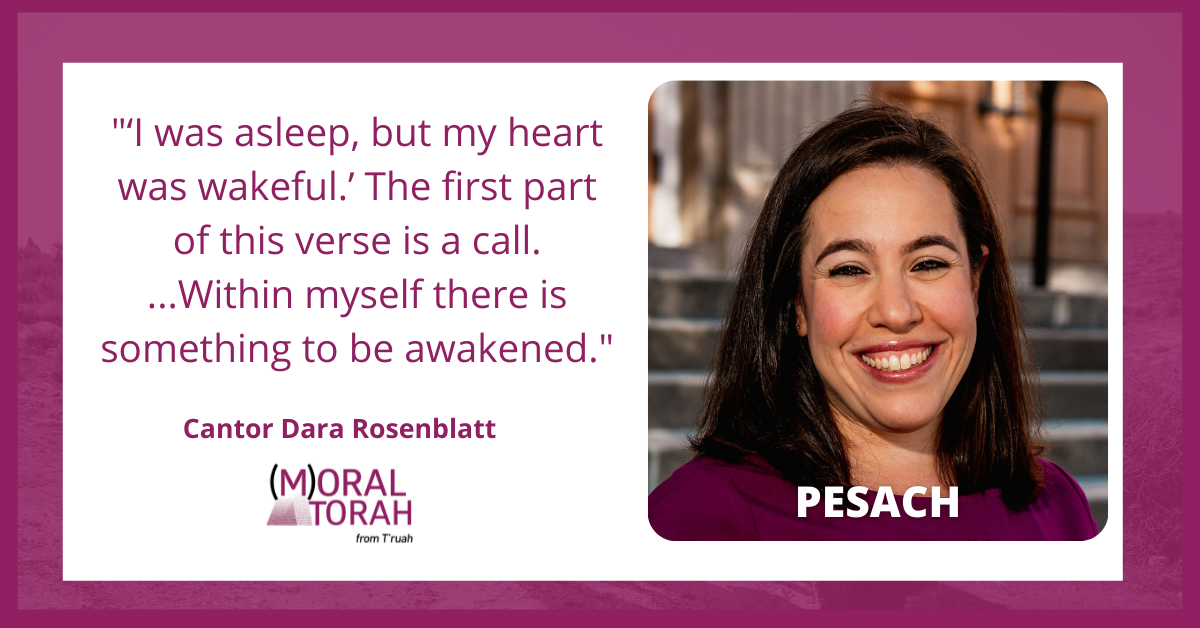A D’var Torah for Pesach by Cantor Dara Rosenblatt
עָנָ֥ה דוֹדִ֖י וְאָ֣מַר לִ֑י ק֥וּמִי לָ֛ךְ רַעְיָתִ֥י יָפָתִ֖י וּלְכִי־לָֽךְ׃
My beloved spoke thus to me,
“Arise, my darling;
My fair one, come away!- Shir HaShirim 2:10
LISTEN: Cantor Rosenblatt sings an original song with this text.
Awakening, an awareness of the world, of the environment, of the love that surrounds us, is present in the beautiful megillah we chant on the Shabbat of Passover. Shir HaShirim, Song of Songs, exemplifies this theme of awakening and opening one’s eyes to the beauty of love. The text above tells the loved one to get up, arise, open your eyes to what is around you! This is a call to focus, pay attention to our surroundings, to get moving and act. I hope that the song I wrote inspires and moves you to do just that.
Sign up to receive (M)oral Torah in your inbox each week.
Like many of my colleagues, in the past few years I have been awakened to the urgency of racial justice issues in our country. Approximately four years ago I moved to Richmond, Virginia, a city still not ready to grapple with its deep racist history. In 2020, protests began on Monument Avenue, surrounding the enormous statues of racist figures of Virginia’s history. Living in Richmond, I became more cognizant and aware of the history and the need for reconciliation, repair, and most of all, change. After George Floyd was murdered, huge protests arose just walking distance from my home, and at this moment, I felt I had to do something. And I believe it is important for me to acknowledge that as a white woman, I am in a privileged position to be active in social justice work in a more quiet, behind the scenes way. So, in the past few years I took the path of education, to read, and engage in literature that would push me and challenge me to understand the depth of the racial justice issues in our country, both locally and nationally.
One of the books that had the most profound impact on me was The Rage of Innocence: How America Criminalizes Black Youth, by Kristin Henning, published in September 2021. I was astonished by this book, the personal accounts of Black youth in our country being mistreated, disrespected, and violated because of the color of their skin. My eyes were opened to a world that shouldn’t exist; a place where no children should live. My heart hurt when I read the stories in this book, and it pained me to hear them.
Now, you may be thinking and wondering how Shir HaShirim connects to the treatment of Black youth in America. Shir HaShirim is all about love: the passion, the depth, the care, the sensitivity that can live within each and every one of us when we truly love someone. Where is this love in our world? I want it to be easy to bring out, something that comes naturally to us, no matter the color of our skin or our backgrounds. But this is not the case.
Find more commentaries on Pesach.
Shir HaShirim is full of calls, alarms, and moments of awakening:
I was asleep,
But my heart was wakeful.
Hark, my beloved knocks!
“Let me in, my own,
My darling, my faultless dove!
For my head is drenched with dew,
My locks with the damp of night.”- Shir HaShirim 5:2
‘I was asleep, but my heart was wakeful’
The first part of this verse is a call. As a white person, I can easily ignore the terrible things going on in the world around me. I can be asleep to the injustice; the innocent children in our midst who are treated differently just because of the color of their skin. But within myself there is something to be awakened. Within each of us there is something that can be awakened. For me, during the past two years, I was infuriated, upset, and deeply saddened by the baseless hatred for Black people that I saw in the news and on the streets of Richmond, Virginia. It was this that drove me to read books that have challenged me to think more deeply about racial justice issues and awakened me to the realities of these injustices. I should know more about the challenges that people around me face. I should be meeting the local organizations doing anti-racism work and donating to them.  Moreover, I should be speaking with my fellow congregants about these issues and how we can help make change. For me, leaning into the love I have for all of humanity pushes me to do more, to make the world a more just place even if only in small ways.
Moreover, I should be speaking with my fellow congregants about these issues and how we can help make change. For me, leaning into the love I have for all of humanity pushes me to do more, to make the world a more just place even if only in small ways.
Shir HaShirim is filled with themes of love, desire, temptation, and attachment. Our privilege in the fight for racial justice as white Americans must be acknowledged, and we must be woken up from our slumber and repair the world, especially as the holiday of Passover comes to a close. May we all truly be free one day soon.
Cantor Dara Rosenblatt is currently in her fourth year as the Cantor at Temple Beth-El in Richmond, Virginia. She is passionate about creating community and building relationships through music, prayer, and social justice activism and education.

